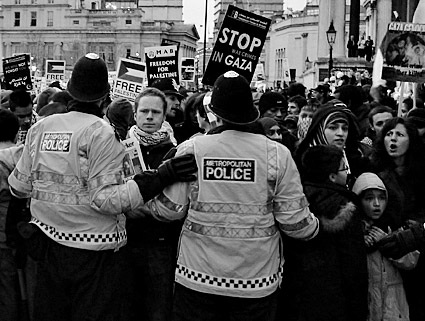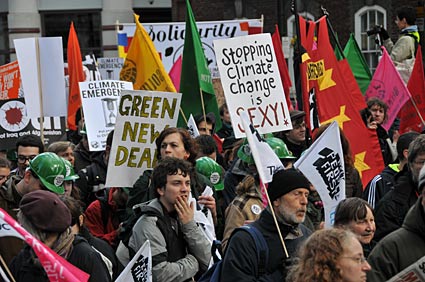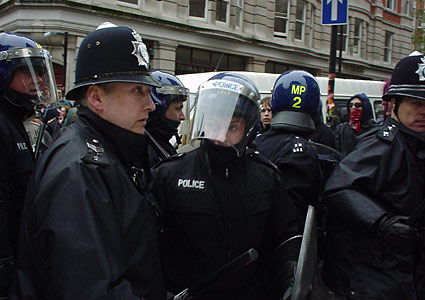PHOTO RIGHTS
People, privacy & children
Photographing Buildings
Tube and railway stations
Trespass/Obstruction etc
Deleting images
'Anti Terrorism' measures
Photographing the police (Sect. 76)
RESOURCES
Your rights on arrest
News, case studies & links
 Photographing protests Photographing protests
Police statements on photography
Discuss this on our forum!
« Photo rights homepage
|
Photographers Rights - photographing protests
Tips and guidance for photographing demos.
(©urban75, updated December 2009)
With increasing incidents of the police 'kettling' protesters at demos (i.e. holding them in a cordon for lengthy periods) and growing reports of the police (illegally) forcing photographers to delete their images, we've put together this brief guide to help ensure that your material remains safe and gets published.
After the damning  video and photographic coverage from the G20 protests leaked through into the mainstream, the police now have more reason than ever to try and make things difficult for photographers and video makers, so it's important you know your rights before setting out and take the necessary precautions. video and photographic coverage from the G20 protests leaked through into the mainstream, the police now have more reason than ever to try and make things difficult for photographers and video makers, so it's important you know your rights before setting out and take the necessary precautions.
BE POLITE
If you start elbowing cops out of the way in your quest to grab the best riot porn shots, don't be surprised if you find yourself arrested for obstruction, extra-sharpish. Always be polite to the cops and step back when requested.
If you've got an NUJ card or other press accreditation (we recommend getting this), wear the card on a lanyard so that it's easy to spot. It won't stop cops whacking you if you're caught in a hotspot, but it may help you get away afterwards.
KEEP ALERT
Keep moving around to make sure you capture as much action as you can, and keep a watchful eye out for kettling actions. Be sure to check out what is happening behind you and constantly look out for good vantage points and possible exit points.

EQUIPMENT
There's pros and cons to taking along beefy professional cameras and the same applies to cheapo point'n'shoot snappers, so take whatever gear you feel comfortable with.
A camera with a wide angle lens is great for capturing close crowd shots and (in our experience) the more crappy you make the thing look, the less you are likely to attract unwanted attention from cops.
If you're using your mobile phone to video the action and upload footage to the web, your batteries will drain quickly, so bring back-up batteries or a back-up power pack like the  Proporta micro charger. Proporta micro charger.
It's also worth packing a cheap second camera in case your main one gets grabbed or broken, and extra batteries are always a good idea.
Your photos may be needed for evidence later, so set the clock on your camera accurately before you set out - a nifty way of confirming this is to take a picture of an accurate public clock (e.g. at a railway station).
When you arrive at the protest, grab a couple of wide angle context shots to show the location and overall picture (here's where a good vantage point comes in) and make timed notes to accompany any important incidents.

TAKING PHOTOS
Be sure to take more than one memory card with you - they can be picked up for next to nothing from websites like  7DayShop, so it's worth investing in a few. 7DayShop, so it's worth investing in a few.
We recommend regularly swapping over the cards when you're shooting, and stashing used cards in a safe and discrete place on your person (we'll leave that to your imagination) or concealing them in hidden pockets, or giving them to friends for safekeeping etc.
Don't delete any pictures, even if they look crap as important things may be going on in the background.
As soon as you get home, copy the images straight to your PC (ideally direct to CD or DVD, with the disk then finalised) and only edit back-up copies rather than originals.


FORCED TO DELETE IMAGES?
The police, security guards or anyone else have no right to demand that you delete images off your memory card. After all, if you've committed an offence the images would act as evidence, and if you haven't broken the law, the images are innocent.
However, in some circumstances, the police may be authorised to confiscate your film or memory cards as evidence but they are still not authorised to delete any images.
If an officer demands you hand over your photos, make sure you get a written receipt. Under no circumstances should you just hand them over without that.
RECOVERING DELETED IMAGES
If you are forced to delete your photos, take the card out of the camera immediately. Whatever you do, do not take any new pictures as these will reduce your chances of recovering the deleted images. If you want to keep on snapping, use a fresh card. When you get home, you can use a file recovery program to get your images back. These often have a high success rate.
We recommend the open source, multi-platform file data recovery software  PhotoRec, and you can see a range of free and commercial offerings here: PhotoRec, and you can see a range of free and commercial offerings here:  Digital Photo Backup, Rescue and Recovery Software. Digital Photo Backup, Rescue and Recovery Software.

UPLOADING PHOTOS
If you have an account with social networking sites like Blogger, Twitter, Facebook etc, it's easy to instantly upload images to your account by setting up your phone to use MMS or email. It's also worth separately emailing important images to yourself as a back up. If you have a regular camera with you and your phone has a suitable SD card slot, consider emailing images straight off your camera.

BROADCASTING LIVE
The police may be able to incarcerate protesters in cordons, but new mobile streaming technologies will make it a redundant gesture.
Using fast 3G connections, protesters will be able to stream movies from their mobile phones directly onto the web from within the 'kettle,' so there's no way the cops can stop the footage getting out (unless they delve even deeper into their dodgy powers and force a mobile signal blackout - a move which would surely prompt serious questions from the general public).
Quite a few phones are already capable of streaming videos directly on to websites and as the technology becomes more commonplace it's going to become increasingly difficult for the police to try and suppress legitimate press and personal coverage of demonstrations.
You can see some example archive videos and live mobile video streams here:  http://qik.com/ http://qik.com/
UPLOADING VIDEOS
If you don't fancy streaming your video, it's still a pretty simple job on most phones to upload the footage from your phone to video sharing sites like YouTube ( see  YouTube guide to uploading videos from a phone). YouTube guide to uploading videos from a phone).
If you feel you've captured an important piece of action, try and upload the footage as quickly as you can and then back it up to a card and hide that on your person.
» Metropolitan Police: official photography advice
» Photographers Rights And The Law In The UK
» Your rights on Arrest - legal help and useful information
ANYTHING MISSING?
We're keen to keep this resource updated and as useful as possible, so it you think we've missed anything important out, please drop us a line on the  bulletin board thread (you'll need to register to post, but it's free). bulletin board thread (you'll need to register to post, but it's free).
Note: Police statements on photography

Note: This article attempts to be a brief educational guide to the sometimes-complex matter of your rights as a photographer. It is not legal advice and we recommend seeking out proper legal advice if you encounter problems or contributing to our bulletin boards. Some material in this article has been sourced from the UK Photographers Rights website.
Photo rights homepage
|



